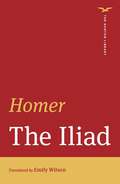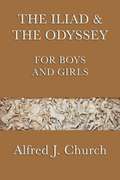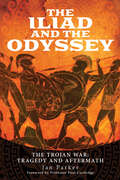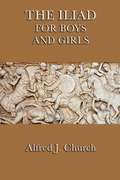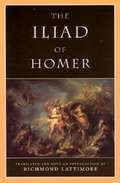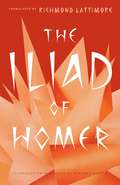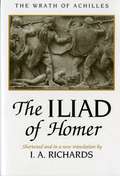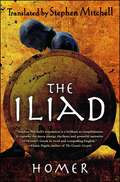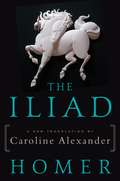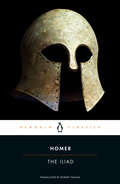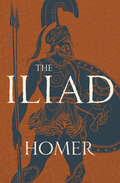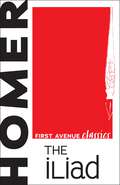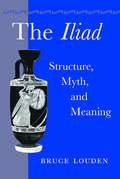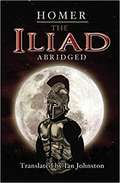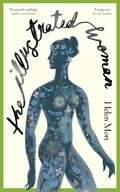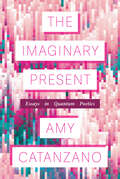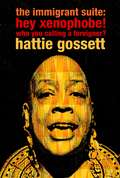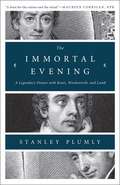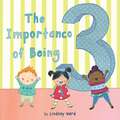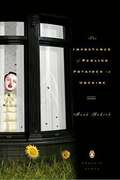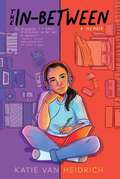- Table View
- List View
The Iliad (Raintree Short Classics Series)
by HomerRetells in simple language the events of the war between Greece and the city of Troy, focusing on Achilles' quarrel with Agamemnon.
The Iliad (The Norton Library)
by HomerPart of the Norton Library series “The experience of reading Homer must be refreshed from time to time with the blood of a new translation. In her version of The Iliad, [Emily] Wilson enlivens the epic with rich sanguinary nutrients. . . . The result is an Iliad of clarity and approachability, its violence rendered with brutal intimacy: Wilson’s translation is zippy, and it zips the reader to a place and time of alien savagery. . . . [T]he vigor of language and vision is undeniable.” —Atlantic The Norton Library edition of The Iliad features the complete text of Emily Wilson’s renowned 2023 translation. An elucidating introduction explores the poem’s Bronze Age origins, its major themes, and its unsurpassed impact and influence. Also included in this edition are specially -drawn maps, a glossary (with pronunciation), and summaries and extensive notes for each book. The Norton Library is a growing collection of high-quality texts and translations—influential works of literature and philosophy—introduced and edited by leading scholars. Norton Library editions prepare readers for their first encounter with the works that they’ll re-read over a lifetime. Inviting introductions highlight the work’s significance and influence, providing the historical and literary context students need to dive in with confidence. Endnotes and an easy-to-read design deliver an uninterrupted reading experience, encouraging students to read the text first and refer to endnotes for more information as needed. An affordable price (most $10 or less) encourages students to buy the book and to come to class with the assigned edition.
The Iliad and the Odyssey for Boys and Girls
by Alfred J. ChurchThe Iliad is typically described as one of the greatest war stories of all time. Set during the Trojan War, this timeless poem vividly conveys the horror and heroism of men and gods wrestling with towering emotions and battling amid devastation and destruction. Homer's tale is a compassionate view of human life lived under the shadow of suffering and death in the face of an often uncaring divinity. To call it a war story does not begin to describe the emotional sweep of its action and characters in the 10th and final year of the Greek siege of Troy.The Odyssey is literature's grandest evocation of everyman's journey though life. The poem centers on the Greek hero Odysseus and his long journey home after the fall of Troy. It takes Odysseus ten years to reach Ithaca after the ten-year Trojan War. Odysseus survives storm and shipwreck, the cave of the Cyclops and the isle of Circe, the lure of the Sirens' song and a trip to the Underworld, only to find his most difficult challenge at home, where treacherous suitors seek to steal his kingdom and his loyal wife, Penelope. The Odyssey is Homers' sequel to the Iliad.
The Iliad and the Odyssey: The Trojan War: Tragedy and Aftermath
by Jan ParkerThe Iliad dealing with the final stages of the Trojan War and The Odyssey with return and aftermath were central to the Classical Greeks' self identity and world view. Epic poems attributed to Homer, they underpinned ideas about heroism, masculinity and identity; about glory, sacrifice and the pity of war; about what makes life worth living. From Achilles, Patroclus and Agamemnon in the Greek camp, Hektor, Paris and Helen in Troy's citadel, the drama of the battlefield and the gods looking on, to Odysseus' adventures and vengeful return - Jan Parker here offers the ideal companion to exploring key events, characters and major themes. A book-by-book synopsis and commentary discuss the heroes' relationships, values and psychology and the narratives' shimmering presentation of war, its victims and the challenges of return and reintegration. Essays set the epics in their historical context and trace the key terms; the 'Journey Home from War' continues with 'Afterstories' of both heroes and their women. Whether you've always wanted to go deeper into these extraordinary works or are coming to them for the first time, The Iliad and the Odyssey: The Trojan War, Tragedy and Aftermath will help you understand and enjoy Homer's monumentally important work.
The Iliad for Boys and Girls
by Alfred J. ChurchVigorous retelling of Homer's Iliad, relating the incidents of the great siege of Troy, from the quarrel of the chiefs to the ransoming of Hector's body. Suitable for ages 8 and up.
The Iliad of Homer
by Homer Richmond LattimoreThe finest translation of Homer ever made into the English language. --William Arrowsmith. "Certainly the best modern verse translation." --Gilbert Highet. "This magnificent translation of Homer's epic poem... will appeal to admirers of Homer and the classics, and the multitude who always wanted to read the great Iliad but never got around to doing so." --The American Book Collector. "Perhaps closer to Homer in every way than any other version made in English." --Peter Green, The New Republic. "The feat is decisive that it is reasonable to foresee a century or so in which nobody will try again to put the Iliad in English verse." --Robert Fitzgerald. "Each new generation is bound to produce new translations. [Lattimore] has done better with nobility, as well as with accuracy, than any other modern verse translator. In our age we do not often find a fine scholar who is also a genuine poet and who takes the greatest pains over the work of translation." --Hugh Lloyd-Jones, New York Review of Books. "Over the long haul Lattimore's translation is more powerful because its effects are more subtle." --Booklist. "Richmond Lattimore is a fine translator of poetry because he has a poetic voice of his own, authentic and unmistakable and yet capable of remarkable range of modulation. His translations make the English reader aware of the poetry." --Moses Hadas, The New York Times.
The Iliad of Homer
by Homer Richmond Lattimore"Sing, goddess, the anger of Peleus' son Achilleus / and its devastation. " For sixty years, that's how Homer has begun the Iliad in English, in Richmond Lattimore's faithful translation--the gold standard for generations of students and general readers. This long-awaited new edition of Lattimore's Iliad is designed to bring the book into the twenty-first century--while leaving the poem as firmly rooted in ancient Greece as ever. Lattimore's elegant, fluent verses--with their memorably phrased heroic epithets and remarkable fidelity to the Greek--remain unchanged, but classicist Richard Martin has added a wealth of supplementary materials designed to aid new generations of readers. A new introduction sets the poem in the wider context of Greek life, warfare, society, and poetry, while line-by-line notes at the back of the volume offer explanations of unfamiliar terms, information about the Greek gods and heroes, and literary appreciation. A glossary and maps round out the book. The result is a volume that actively invites readers into Homer's poem, helping them to understand fully the worlds in which he and his heroes lived--and thus enabling them to marvel, as so many have for centuries, at Hektor and Ajax, Paris and Helen, and the devastating rage of Achilleus.
The Iliad of Homer: The Wrath of Achilles
by HomerThis edition is a translation of a great Greek epic "The Iliad" by noted critic I. A. Richards, who has presented the sequence of events during the Trojan war in a more simplified way to make it suitable for modern and non-specialist readers.
The Iliad: (The Stephen Mitchell Translation)
by Homer Stephen MitchellTOLSTOY CALLED THE ILIAD A miracle; Goethe said that it always thrust him into a state of astonishment. Homer’s story is thrilling, and his Greek is perhaps the most beautiful poetry ever sung or written. But until now, even the best English translations haven’t been able to re-create the energy and simplicity, the speed, grace, and pulsing rhythm of the original. In Stephen Mitchell’s Iliad, the epic story resounds again across 2,700 years, as if the lifeblood of its heroes Achilles and Patroclus, Hector and Priam flows in every word. And we are there with them, amid the horror and ecstasy of war, carried along by a poetry that lifts even the most devastating human events into the realm of the beautiful. Mitchell’s Iliad is the first translation based on the work of the preeminent Homeric scholar Martin L. West, whose edition of the original Greek identifies many passages that were added after the Iliad was first written down, to the detriment of the music and the story. Omitting these hundreds of interpolated lines restores a dramatically sharper, leaner text. In addition, Mitchell’s illuminating introduction opens the epic still further to our understanding and appreciation. Now, thanks to Stephen Mitchell’s scholarship and the power of his language, the Iliad’s ancient story comes to moving, vivid new life.
The Iliad: A New Translation by Caroline Alexander
by Homer Caroline AlexanderWith her virtuoso translation, classicist and bestselling author Caroline Alexander brings to life Homer’s timeless epic of the Trojan WarComposed around 730 B.C., Homer’s Iliad recounts the events of a few momentous weeks in the protracted ten-year war between the invading Achaeans, or Greeks, and the Trojans in their besieged city of Ilion. From the explosive confrontation between Achilles, the greatest warrior at Troy, and Agamemnon, the inept leader of the Greeks, through to its tragic conclusion, The Iliad explores the abiding, blighting facts of war.Soldier and civilian, victor and vanquished, hero and coward, men, women, young, old—The Iliad evokes in poignant, searing detail the fate of every life ravaged by the Trojan War. And, as told by Homer, this ancient tale of a particular Bronze Age conflict becomes a sublime and sweeping evocation of the destruction of war throughout the ages.Carved close to the original Greek, acclaimed classicist Caroline Alexander’s new translation is swift and lean, with the driving cadence of its source—a translation epic in scale and yet devastating in its precision and power.
The Iliad: Edited With Apparatus Criticus, Prolegomena, Notes And Appendices: Vol I. , Books I-xii (Enriched Classics Ser. #171)
by Homer Bernard Knox Robert FaglesDating to the ninth century BC, Homer's timeless poem still vividly conveys the horror and heroism of men and gods wrestling with towering emotions and battling amidst devastation and destruction, as it moves inexorably to the wrenching, tragic conclusion of the Trojan War. Renowned classicist Bernard Knox observes in his superb Introduction that although the violence of the Iliad is grim and relentless, it coexists with both images of civilized life and a poignant yearning for peace. Combining the skills of a poet and scholar, Robert Fagles brings the energy of contemporary language to this enduring heroic epic. He maintains the drive and metric music of Homer's poetry, and evokes the impact and nuance of the Iliad's mesmerizing repeated phrases in what Peter Levi calls "an astonishing performance."
The Iliad: From The Text Of Dindorf; Books I-xii (classic Reprint)
by HomerAlexander Pope&’s beautiful verse translation of the Ancient Greek epic of the Trojan War. One of the oldest surviving works in Western literature, Homer&’s epic poem has captivated readers for millennia. Set at the end of the Greeks&’ decade-long siege of Troy, it centers on a quarrel between the Greek King Agamemnon and his greatest asset in battle, the warrior Achilles. From this conflict between two great men, The Iliad weaves a tale of warring nations, vengeful gods, plagues, betrayals, and the terrible consequences of prideful rage. This ebook has been professionally proofread to ensure accuracy and readability on all devices. &“Many consider [Pope&’s translation] the greatest English Iliad. . . . It manages to convey not only the stateliness and grandeur of Homer&’s lines, but their speed and wit and vividness.&” —The New Yorker &“Pope worked miracles. . . ,This is a poem you can live your way into, over the years, since it yields more at every encounter.&” —TheNew York Times
The Iliad: From The Text Of Dindorf; Books I-xii (classic Reprint) (First Avenue Classics ™)
by HomerThe tenth and final year of the Trojan War comes to its climactic end in this infamous Greek epic. With the mighty Achilles brooding on the sidelines of the battle, the Greek army faces almost certain defeat. At the mercy of the intervening gods of Mount Olympus, the legendary warriors of Greece and Troy fight to the death in the name of honor, love, and vengeance. Originally written around 750 BCE, the authorship of this epic poem remains uncertain, but most scholars ascribe it to a blind Greek poet named Homer. William Cowper first published his translation in 1791; this unabridged edition comes from the work edited by Robert Southey, LL.D., with notes by M. A. Dwight, which was published in 1860.
The Iliad: Structure, Myth, and Meaning
by Bruce LoudenExtending his distinctive analysis of Homeric epic to the Iliad, Bruce Louden, author of The "Odyssey": Structure, Narration, and Meaning, again presents new approaches to understanding the themes and story of the poem. In this thought-provoking study, he demonstrates how repeated narrative motifs argue for an expanded understanding of the structure of epic poetry. First identifying the "subgenres" of myth within the poem, he then reads these against related mythologies of the Near East, developing a context in which the poem can be more accurately interpreted.Louden begins by focusing on the ways in which the Iliad's three movements correspond with and comment on each other. He offers original interpretations of many episodes, notably in books 3 and 7, and makes new arguments about some well-known controversies (e.g., the duals in book 9), the Iliad's use of parody, the function of theomachy, and the prefiguring of Hektor as a sacrificial victim in books 3 and 6. The second part of the book compares fourteen subgenres of myth in the Iliad to contemporaneous Near Eastern traditions such as those of the Old Testament and of Ugaritic mythology. Louden concludes with an extended comparison of the Homeric Athena and Anat, a West Semitic goddess worshipped by the Phoenicians and Egyptians. Louden's innovative method yields striking new insights into the formation and early literary contexts of Greek epic poetry.
The Iliad: Translated By Ian Johnston
by Homer Ian JohnstonHomer's Iliad, the oldest and greatest epic poem in our culture, was composed in the eighth century BC. It became the single most important literary resource in ancient Greek culture, and has exercised a decisive influence on Western culture an influence which continues to this day. The poem tells the story of a quarrel between Achilles, the greatest of the Achaean warriors in the Greek expedition against Troy, and Agamemnon, the commander of the expedition an argument which causes Achilles to withdraw from the fighting. The battles continue without him, and the ironic unfolding of events eventually leads him to rejoin the war and to seek out the great Trojan warrior Hector for a climactic single combat. The Iliad is our most important war poem. It constantly forces us to confront what goes on in battle, how men sustain themselves amid the horrors of the killing zone, and how the activity is simultaneous intensely and brutally destructive and also, by one of the strangest of all of life's ironies, intensely creative. Ian Johnston's abridged version of Homer's great poem is based upon his acclaimed translation of the complete epic (also published by Richer Resources Publications). The abridged text is approximately one third of the original and presents a coherent narrative poem in which every line is taken from Homer's text, with occasional short summaries to keep the story coherent. This shortened version is an ideal entry into Homer's vision of the world for those who are not yet ready or do not have the time to tackle the full poem. The text is accompanied by a few explanatory footnotes, a glossary of names, and a map indicating the origin of many of the major characters.
The Iliad: a commentary
by G. S. KirkThis, the fourth volume in the six-volume Commentary on The Iliad being prepared under the General Editorship of Professor G. S. Kirk, covers Books 13-16, including the Battle for the Ships, the Deception of Zeus and the Death of Patroklos. Three introductory essays discuss the role of Homer's gods in his poetry; the origins and development of the epic diction; and the transmission of the text, from the bard's lips to our own manuscripts. It is now widely recognised that the first masterpiece of Western literature is an oral poem; Professor Janko's detailed commentary aims to show how this recognition can clarify many linguistic and textual problems, entailing a radical reassessment of the work of Homer's Alexandrian editors. The commentary also explores the poet's subtle creativity in adapting traditional materials, whether formulae, typical scenes, mythology or imagery, so as best to move, inspire and entertain his audience, ancient and modern alike. Discussion of the poem's literary qualities and structure is, where possible, kept separate from that of more technical matters.
The Illiad
by Homer Richmond LattimoreModern translation of the Greek classic about the Trojan War. Includes a Good introduction.
The Illustrated Woman: SHORTLISTED FOR THE FORWARD PRIZE 2022
by Helen Mort*SHORTLISTED FOR THE 2022 FORWARD PRIZE FOR BEST COLLECTION*'A raw, tender, potent collection' - JESSICA ANDREWS'Gorgeous poems - profound, exploratory, wild, playful - and completely now' - RUTH PADEL________The brilliant new collection from T.S. Eliot Prize and Costa Award shortlisted poet Helen MortLet me kneelbefore the sky and let me be humble, untidy,let me be decorated.Here are women's bodies. Hungry adolescent bodies, fluctuating pregnant bodies, ailing aging bodies. Here are bodies as products to be digitized and consumed. Here is the body in nature, changing and growing stronger. Here are tattooed women through history, ink unfurling across their skin.The Illustrated Woman is a tender and incisive collection about what it means to live in a female body - from the joys and struggles of new motherhood to the trauma of deepfakes. Amidst the landscapes of the Peak District and the glaciers of Greenland, Helen Mort's remarkable poems transfix the reader in a celebration of beauty and resilience.'These are poems that will leave their indelible mark' - ANDREW MCMILLAN
The Image of the Artist in Archaic and Classical Greece
by Guy HedreenThis book explores the persona of the artist in Archaic and Classical Greek art and literature. Guy Hedreen argues that artistic subjectivity, first expressed in Athenian vase-painting of the sixth century BCE and intensively explored by Euphronios, developed alongside a self-consciously constructed persona of the poet. He explains how poets like Archilochos and Hipponax identified with the wily Homeric character of Odysseus as a prototype of the successful narrator, and how the lame yet resourceful artist-god Hephaistos is emulated by Archaic vase-painters such as Kleitias. In lyric poetry and pictorial art, Hedreen traces a widespread conception of the artist or poet as socially marginal, sometimes physically imperfect, but rhetorically clever, technically peerless, and a master of fiction. Bringing together in a sustained analysis the roots of subjectivity across media, this book offers a new way of studying the relationship between poetry and art in ancient Greece.
The Imaginary Present: Essays in Quantum Poetics (Poets On Poetry)
by Amy CatanzanoThe Imaginary Present by award-winning poet and professor Amy Catanzano explores cutting-edge scientific fields such as particle physics and astrophysics, and branches of physics such as quantum theory and relativity, through a poetic vision equally loyal to the imagination and rationality. Drawing upon her groundbreaking research and artist residencies at major scientific research centers like CERN and the U.S. National Science Foundation’s NOIRLab, as well as talks and poetry readings at esteemed institutions, Catanzano invites enthusiasts of poetry and science to consider what can be achieved through greater collaboration between these fields. In linked chapters that fluidly blend lyric essay, literary and scientific analysis, poetry, theory, and memoir, The Imaginary Present offers refreshing new insights on a wide range of thinkers over the past 100 years, including poets Rae Armantrout and M. NourbeSe Philip, novelists Alfred Jarry and Virginia Woolf, comic book writer Grant Morrison, and physicists Albert Einstein and Werner Heisenberg. The introduction explores why poetry and physics are capable of jointly investigating our most fundamental questions about the universe and discusses the history of the art-science connection in addition to the author’s own journey. In searching for the groundbreaking ways that artists and scientists can collaborate, The Imaginary Present offers readers both reasoned grounding and poetic framing for an interdisciplinary poetics and praxis based on science.
The Immigrant Suite: Hey Xenophobe, Who You Calling a Foreigner?
by Hattie GossettWriting from the upper west side of Manhattan, where Harlem intersects with waves of immigrants from the Dominican Republic, Cuba, Puerto Rico, Korea, Cambodia, Ivory Coast, India, Native America, and from all over the globe, Hattie Gossett vividly invokes her neighborhood experience. With wit and candor, she questions why so many people are forced from their home countries, only to be despised as interlopers in the United States; why older immigrants see younger ones as the enemy; who gets paid a living wage, who gentrifies their neighborhood, and who sends their money back home. From the grocery store to the cleaners to the tenement walk-up and everywhere in between, Gossett captures the voices overheard and imagined in this breathless immigrant suite.
The Immortal Evening: A Legendary Dinner with Keats, Wordsworth, and Lamb
by Stanley PlumlyA window onto the lives of the Romantic poets through the re-creation of one legendary night in 1817. The author of the highly acclaimed Posthumous Keats, praised as "full of . . . those fleeting moments we call genius" (Washington Post), now provides a window into the lives of Keats and his contemporaries in this brilliant new work. On December 28, 1817, the painter Benjamin Robert Haydon hosted what he referred to in his diaries and autobiography as the "immortal dinner." He wanted to introduce his young friend John Keats to the great William Wordsworth and to celebrate with his friends his most important historical painting thus far, "Christ's Entry into Jerusalem," in which Keats, Wordsworth, and Charles Lamb (also a guest at the party) appeared. After thoughtful and entertaining discussions of poetry and art and their relation to Enlightenment science, the party evolved into a lively, raucous evening. This legendary event would prove to be a highlight in the lives of these immortals. A beautiful and profound work of extraordinary brilliance, The Immortal Evening regards the dinner as a lens through which to understand the lives and work of these legendary artists and to contemplate the immortality of genius.
The Importance of Being 3
by Lindsay WardThe perfect present for three-year-olds, this picture book is a celebration of all things three! All the best things come in threes, not one, not two, but three, like the three-year-olds in this sweet picture book. As all parents know, three is a big year. Follow along as three friends learn new things in threes—from tricycles to triangles—take a dip in the pool, and play in the park with their friends! Of course, it&’s not all fun and games. There&’s a tantrum and then hugs all around as the three kids head to bed. This adorable picture book celebrating important life events is the perfect gift for third birthdays. Kids will love pointing out all the activities they can do now that they are three years old.
The Importance of Peeling Potatoes in Ukraine
by Mark YakichAn unconventional new collection from a National Poetry Series award winner Mark Yakich 's acclaimed debut collection, Unrelated Individuals Forming a Group Waiting to Cross, examined the blessing and curse of romantic love in its multiplicities. The poems in his new collection approach questions of suffering and atrocity (e.g., war, genocide, fallen soufflés) with discerning humor and unconventional comedy. These poems show how humor can be taken as seriously as straight-ahead solemnity and how we can re-envision solemnity in terms other than lamentation, protest, and memorial.
The In-Between
by Katie Van HeidrichFor fans of Enchanted Air by Margarita Engle and Life in Motion by Misty Copeland, this middle grade memoir in verse with &“stellar writing [and] perfect pacing&” (Kirkus Reviews, starred review) chronicles a young girl and her family who must start over after losing their home.In the early 2000s, thirteen-year-old Katie Van Heidrich has moved more times that she can count, for as long as she can remember. There were the slow moves where you see the whole thing coming. There were the fast ones where you grab what you can in seconds. When Katie and her family come back from an out-of-town funeral, they discover their landlord has unceremoniously evicted them, forcing them to pack lightly and move quickly. They make their way to an Extended Stay America Motel, with Katie&’s mother promising it&’s temporary. Within the four walls of their new home, Katie and her siblings, Josh and Haley, try to live a normal life—all while wondering if things would be easier living with their father. Lyrical and forthcoming, Katie navigates the complexities that come with living in-between: in between homes, parents, and childhood and young adulthood, all while remaining hopeful for the future.

